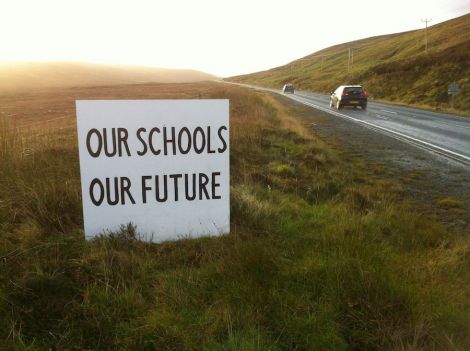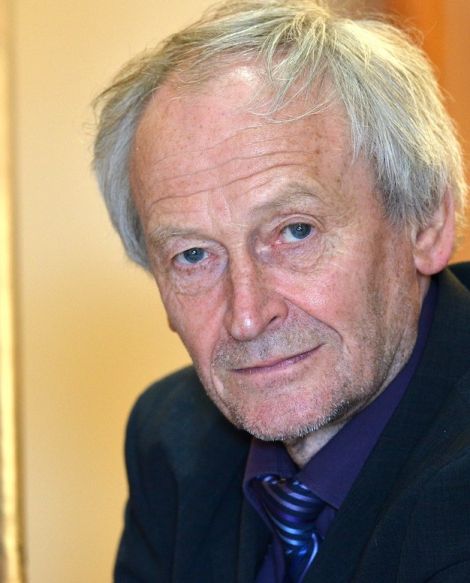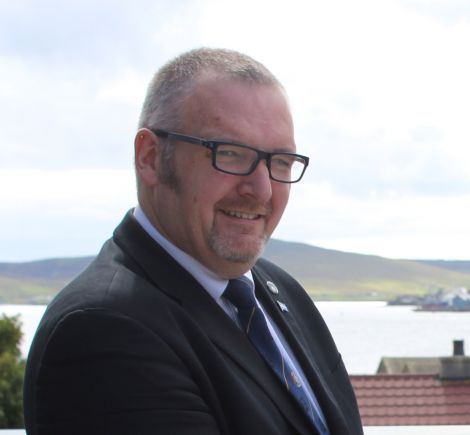News / What now for education in Shetland?
THE FUTURE of education in Shetland is set to be raised with Holyrood and local government watchdogs as councillors mull the consequences of their decision to keep closure-threatened schools open this week.
Shetland Islands Council leader Gary Robinson is planning to challenge the Scottish government on how island authorities can meet government targets to retain teachers and protect rural schools on a decreasing budget.
Meanwhile SIC audit committee chairman Allison Duncan has said he believes the Accounts Commission and Audit Scotland should be informed of the waste of money spent on school closures that have not gone through.
Duncan’s move follows a call by Lerwick South member Jonathan Wills to alert the watchdogs about the loss of “at least £1 million” spent on consultations to close schools over the past 12 years.
Duncan, who led the charge to close schools along with Wills, is taking legal advice before spending the weekend deciding how to proceed.
“I think things have to calm down, but I do agree with Dr Wills that this should be investigated. I am not sure how, but I think at least Audit Scotland and The Accounts Commission should be made aware of what has happened,” he said.
It emerged during Wednesday’s lengthy debate that the council had spent almost £640,000 on its Blueprint for Education process in the last five years alone.
Since 2002 some schools have faced four unsuccessful attempts to close them down, including North Roe, which was saved this week.
Wills said he believes that the council would not be able to close any more primary or secondary schools after this week’s vote.
“If you are leaving open schools with five pupils you set a precedent, you can’t close any other schools,” he said.
Meanwhile parent councils across Shetland are complaining money has become so tight that they are having to raise funds themselves to buy essentials to keep primary schools running.
Become a member of Shetland News
Chairman of Bell’s Brae parent council in Lerwick, David Thomson, told BBC Radio Shetland that they were reaching the point where “bairns are not being properly schooled at all” after losing two thirds of their resource budget.
“To put it bluntly, the school no longer has the ability to receive less money without providing less education,” he said.
Duncan said he had been told of one rural primary school where teachers were dipping into their own pockets to provide pens, rubbers and pencils.
“The cupboards are bare, the financial reserves are non existent,” he said.
Frustration over Shetland’s predicament has led council leader Gary Robinson to demand a showdown with the Scottish government.
“The government is asking us to provide education on a reducing income with greater protection for rural schools. That comes at a cost and at the moment the SIC is bearing that cost from reserves, money that should really be spent on social care,” he said.
This week he highlighted the £19 million gap between what Shetland receives for education (£29.5m) and what it spends (£48.5m), a gap that is met from its oil reserves and extra money it receives for being debt free.
Finances are going to get much tighter over the next two years when the council may have to find an extra £12 million to meet rising wage bills, energy/fuel costs, cuts in government grants and extra spending on social care.
“That’s a huge worry,” Robinson said, “and I am not sure we have got that message through to people. The fact that we are going to have less money to spend is very real.
“We have already reduced spending by 18 to 20 per cent since 2010, we have shielded to a very big degree education and social care, but we are getting to a point where we simply can’t protect our services.”
Robinson said the Scottish government was making the situation worse with conflicting policies requiring councils to provide best value while maintaining teacher numbers and protecting rural schools.
Added to that is the introduction of a new Curriculum for Excellence designed for six year secondary schools, when Shetland and the other Scottish islands had two, three and four year secondary schools.
“What I have found quite difficult and frustrating through this process is neither the Scottish government or Education Scotland will come off the fence and say we have changed the way the whole curriculum is delivered and here is what you need to do in order to deliver that.
“The whole Curriculum for Excellence was based on everyone having the same six year schools, but in the islands it’s different.
“The work has not been done on what would work for us in the islands and how to pay for it.”
Robinson raised his concerns by letter with Scottish finance secretary John Swinney last month, who has now offered to arrange for him to meet cabinet secretaries Mike Russell and Angela Constance soon.
He says he has support from other councils within the highlands and islands who are equally concerned about conflicting government policy.
Back home the big question now hovers over the future of secondary education after councillors agreed not only to keep North Roe and Urafirth primaries open, but to lift the threat to primaries in Sandness and Burravoe.
Campaign group CURE (Communities United for Rural Education) has called for a halt to the consultation into closing Shetland’s five junior high schools or removing S4.
Secretary Gordon Thomson said: “We would like them to defer or discontinue the secondary proposals because they can see there is a massive amount of opposition to school closures or school reduction.
“These are communities trying to increase in size and we can’t keep cutting them. The council should continue to support rural areas.”
Robinson said he could not comment while the consultations on Mid Yell and Symbister were ongoing, but he implied it might be wise to wait until the new Anderson High School was completed in 2017.
“We have had a clear indication from Education Scotland that they consider the opening of the new Anderson High School as a key time to make changes to our education system.
“I think we need to reflect on that information in light of the delay to building the school.
“I think our officers’ time would be much better spent on developing the Shetland Learning Partnership and focusing on delivering the new Anderson High, which I think will have a major impact on education within the whole of Shetland.
“And I look forward to comments from Education Scotland on our proposals for secondary education that could help frame how we deal with the school estate.”
Become a member of Shetland News
Shetland News is asking its many readers to consider paying for membership to get additional features and services: -
- Remove non-local ads;
- Bookmark posts to read later;
- Exclusive curated weekly newsletter;
- Hide membership messages;
- Comments open for discussion.
If you appreciate what we do and feel strongly about impartial local journalism, then please become a member of Shetland News by either making a single payment, or setting up a monthly, quarterly or yearly subscription.































































